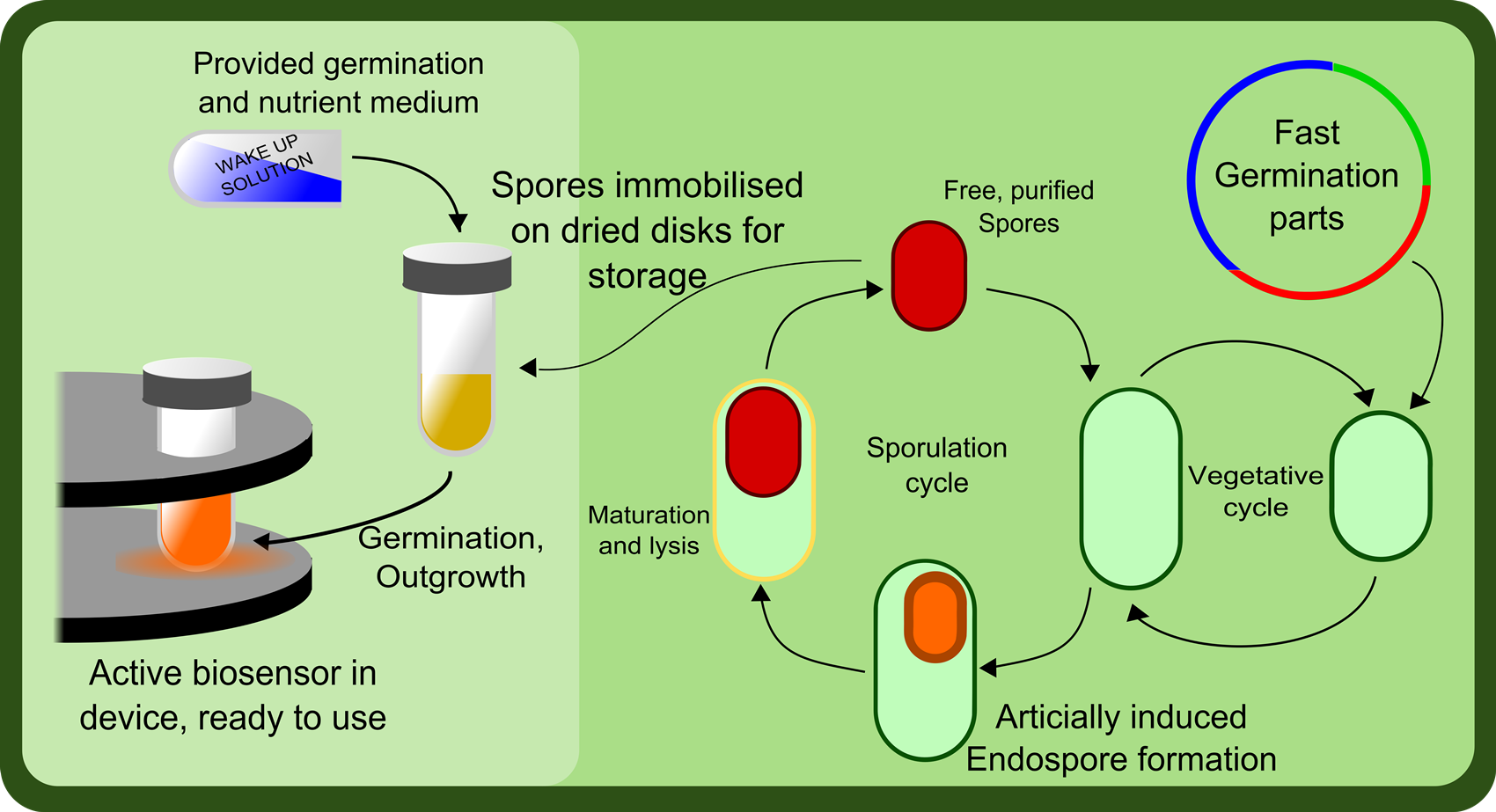Team:Cambridge/Project/Sporulation and Germination
From 2012.igem.org
(Created page with "{{Template:Team:Cambridge/CAM_2012_TEMPLATE_HEAD_PROJECT}} =Sporulation and Germination= sporulation and storage scheme Another aspect to t...") |
|||
| Line 5: | Line 5: | ||
[[File:sporucycle.png|750px|thumb|sporulation and storage scheme]] | [[File:sporucycle.png|750px|thumb|sporulation and storage scheme]] | ||
| - | + | An issue with existing biosensors is the longevity of the product. While e.coli cells will quite happily live in liquid culture or on the appropriate plates, distribution and care-free storage requires a more robust chassis. Ideally, we would like individual tubes of bacterial 'sensors' to sit in the user's cupboard until needed. When the user requires a specific sensor, the appropriate strain is selected and the bacteria can be germinated by following a simple protocol. They can then be placed into the arduino device, the sample loaded and the concentration profile measured. | |
Part of the main reason for choosing ''Bacillus subtilis'' as our chassis was because of it's abiltiy to form dormant spores. As part of our project, we aim to determine a protocol for inducing sporulation in ''Bacillus'', and determine a very simple protocol for germinating the spores so they can be used as part of the system. | Part of the main reason for choosing ''Bacillus subtilis'' as our chassis was because of it's abiltiy to form dormant spores. As part of our project, we aim to determine a protocol for inducing sporulation in ''Bacillus'', and determine a very simple protocol for germinating the spores so they can be used as part of the system. | ||
| - | It is essential for the germination procedure to be as straight forward as possible, requiring minimal equipment and expertise, so that it could in theory be performed in the field, in a situation where the biosensor might be used. | + | It is essential for the germination procedure to be as straight forward as possible, requiring minimal equipment and expertise, so that it could in theory be performed in the field, in a situation where the biosensor might be used. It would also be desirable to speed up the germination process, so that the entire procedure could be undertaken in as little time as possible. |
[[Team:Cambridge/Project/sporulationandgermination|.]] | [[Team:Cambridge/Project/sporulationandgermination|.]] | ||
| + | |||
| + | ===References=== | ||
| + | |||
| + | |||
{{Template:Team:Cambridge/CAM_2012_TEMPLATE_FOOT}} | {{Template:Team:Cambridge/CAM_2012_TEMPLATE_FOOT}} | ||
Revision as of 00:02, 20 September 2012


Sporulation and Germination
An issue with existing biosensors is the longevity of the product. While e.coli cells will quite happily live in liquid culture or on the appropriate plates, distribution and care-free storage requires a more robust chassis. Ideally, we would like individual tubes of bacterial 'sensors' to sit in the user's cupboard until needed. When the user requires a specific sensor, the appropriate strain is selected and the bacteria can be germinated by following a simple protocol. They can then be placed into the arduino device, the sample loaded and the concentration profile measured.
Part of the main reason for choosing Bacillus subtilis as our chassis was because of it's abiltiy to form dormant spores. As part of our project, we aim to determine a protocol for inducing sporulation in Bacillus, and determine a very simple protocol for germinating the spores so they can be used as part of the system.
It is essential for the germination procedure to be as straight forward as possible, requiring minimal equipment and expertise, so that it could in theory be performed in the field, in a situation where the biosensor might be used. It would also be desirable to speed up the germination process, so that the entire procedure could be undertaken in as little time as possible.
References
 "
"
